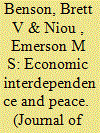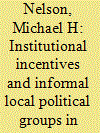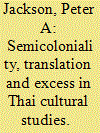| Srl | Item |
| 1 |
ID:
077673


|
|
|
|
|
| Publication |
2007.
|
| Summary/Abstract |
This article considers the problem of North Korea's collective farms from a micro-institutional perspective. It begins with an analysis of the collective farming system introduced in 1958, the changes in 1966 that allowed for subwork teams, and the further reform of 1996 that permitted a new work squad system. The normalization of North Korea's agriculture is not just a technological problem; rather, it requires reform of the collective farms and their incentives: the removal of the inefficient elements in the shorter term and the promotion of family farming in the medium to longer term.
|
|
|
|
|
|
|
|
|
|
|
|
|
|
|
|
| 2 |
ID:
077671


|
|
|
|
|
| Publication |
2007.
|
| Summary/Abstract |
Most of the contemporary policy debate regarding economic interdependence and peace has focused on devising responses either in favor of or in opposition to the prevailing notion that trade is positively and unconditionally correlated with peace. The China and Taiwan case-noteworthy for the simultaneous presence of an ever-increasing economic interdependence and an adversarial political relationship-provides an interesting counter-example to the leading positions in the literature. What is missing in the literature is a model that studies states' decisions to trade and initiate conflict as a function not only of their own utility but also of their perceptions about how their opponent will respond. States' decisions to trade depend on the likelihood that their prospective trade partner will initiate a conflict, and decisions to initiate a conflict depend on perceptions of the likelihood that the target will concede. In this article, the authors develop a model that expands the domain of the trade-peace analysis by endogenizing and analyzing states' decisions to trade and initiate conflicts
|
|
|
|
|
|
|
|
|
|
|
|
|
|
|
|
| 3 |
ID:
077672


|
|
|
|
|
| Publication |
2007.
|
| Summary/Abstract |
South Korea's economic takeoff in the 1960s triggered a scholarly debate over the causes behind its economic growth. Neoclassical economists and "statist" scholars focused on government policies toward the industrial sector, but as this article shows, they have neglected to consider the political economy behind the government's targeting of the agricultural and livestock sectors for export promotion. In fact, the South Korean government's support of export-led growth-aimed at the rural sector as well as industry-transformed the nation's agricultural and livestock institutions from instruments of development and export promotion into protectionist mechanisms. This article discusses how complete market liberalization would have resulted in more efficient resource allocation and reveals how political considerations affected the institutional arrangement in the South Korean countryside and the subsequent liberalization of agricultural and beef markets.
|
|
|
|
|
|
|
|
|
|
|
|
|
|
|
|
| 4 |
ID:
077670


|
|
|
|
|
| Publication |
2007.
|
| Summary/Abstract |
The failure of Japanese electronics firms to participate fully in the Internet-fueled growth of the global electronics industry during the late 1990s triggered a period of questioning among top executives. This article examines Japanese managerial responses to the organizational model "value chain modularity," which was deployed by the US electronics firms driving the creation of the Internet. While there were partial but significant steps taken in the direction of this new US model-increased specialization, outsourcing of low-end products, and shared factory investments in Japan -wholesale restructuring was resisted. This evidence is consistent with larger patterns of gradual institutional change in Japan . I argue that the result of this process will likely be increased, not diminished, institutional diversity over time. While globalization has accelerated the pace of change by opening new avenues for organizational experimentation and institutional layering, the drag on organizational change exerted by existing institutions slows the process enough to allow institutional and organizational innovations to develop into coherent systems with distinct characteristics. The result, inevitably, will be a uniquely Japanese approach to the challenges posed by globalization.
|
|
|
|
|
|
|
|
|
|
|
|
|
|
|
|
| 5 |
ID:
077674


|
|
|
| 6 |
ID:
064864


|
|
|